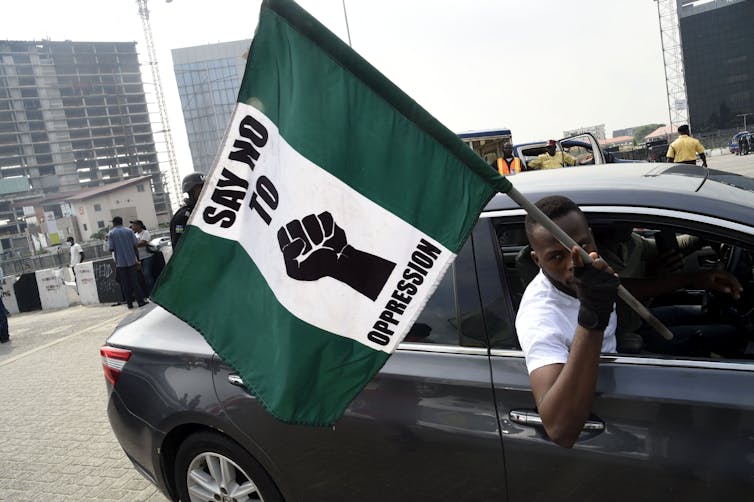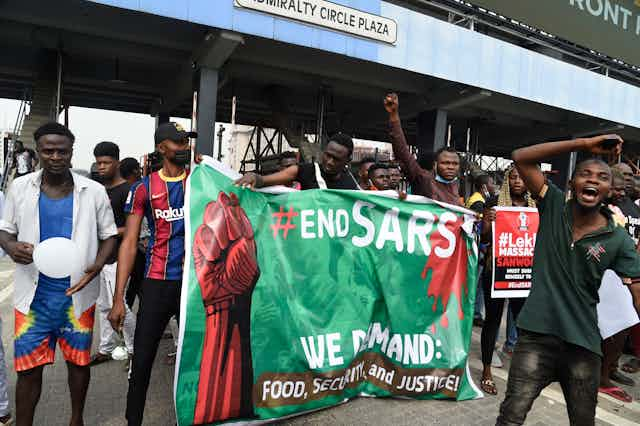Mobile messaging services have become influential in recent times in reshaping social movements.
They make it cheaper and quicker for protesters to mobilise resources. They also circumvent conventional communication networks so people can create personalised narratives, decentralise logistics, and gain communicative power.
In a recent paper I explored the Twitter activities of the #EndSARS protesters in Nigeria on the night of 20 October 2020. Armed Nigerian military personnel allegedly stormed Lekki Toll Gate, one of the most active and visible sites of the protests against police brutality. They reportedly shot live rounds into the crowd of young protesters. The news got explosive reactions on Nigerian spaces on social media, local African communities and the Nigerian diaspora networks. The day of the shooting – which is now called Black Tuesday – will be remembered as one of the darkest times in Nigeria’s recent history.
My research evaluated the role of influencers within the movement. I also identified the emotions being expressed, mostly anger or hope. I discovered that users trusted foreign-owned media houses more than local ones. Also, I found that diaspora Nigerians amplified news of the shooting on an international level.
My paper provides insights into how social media apps such as Twitter are used by young Nigerians. I did this by using an automated program to examine the connective action among the social media users who used the #EndSARS hashtag.
The Nigerian government recently banned Twitter, without considering the negative consequences. The move shows a lack of understanding of the role of social media in the lives of young Nigerians. Young Nigerians already suffer marginalisation in most aspects of their political and social experiences. This ban added to it.
Young Nigerians and Twitter
Young people are the majority of Africa’s population – the median age is 19.5 – giving Africa an enviable position as the world’s youngest continent.
But policies on the continent, particularly in Nigeria, are not always inclusive of youth advancement. This is counter-productive. As recent academic research has shown, there are growing concerns among developed nations about youth participation in governance. Some scholars have to tried to give reasons for this supposed lack of interest among young Africans. These include a dissatisfaction with the formal institutions of politics and governance and lack of trust for these formal institutions.
But young people’s use of technology shows that they are interested in politics and governance. Instead of using conventional methods, Nigeria’s youth have found other reliable means of participating.
Twitter serves that purpose. The micro-blogging site has become a favourite among politically conscious young Nigerians. Twitter is a one-stop shop for young Nigerians, who put it to a range of uses including job connections, marketing products, finding missing people and directly challenging public officials.

Due to the ban, Nigeria’s economy has reportedly lost $4.86 million daily (over 2 billion naira).
Despite this, resilient young people have stuck to the platform. They have continued to use the site by finding by-pass channels using virtual private networks. Their refusal to leave Twitter not only underscores how crucial the platform is in their daily lives, it is also a political statement.
The night of the Lekki shooting is a great example of Twitter’s importance to Nigeria’s youth.
The Lekki shooting
For my research, I retrieved over 18,000 tweets on the night of the Lekki shooting, probing them for dominant themes. I used the NodeXL software to analyse connected action within the #EndSARS hashtag.
I discovered that the most influential Twitter users within the selected tweets were a mix of activists, celebrities and foreign media handles. The dominance of foreign media handles indicates young Nigerians’ distrust for their local media.
Nigerians in the diaspora also emerged as formidable allies of their home-based compatriots on the night of the shooting. As threats of an internet shut-down loomed over protesting youths on the ground, Nigeria’s diaspora community emerged, assisting with increased amplification of events. It was social media collaboration at its finest. The hashtag exploded, attracting global attention from celebrities who joined in the conversation to demand justice.
Unending youth marginalisation
The events that led to the Lekki shooting – the curfew imposition and government’s call on the youths to disperse – reveal a disconnect between Nigeria’s political class and the masses. It suggests an unwillingness to listen and cooperate with citizens. By sending in armed officers to the protest site, the government was communicating that it preferred scare tactics to progress.
The Twitter ban follows this format of silencing dissent. Due to Twitter’s role in the #EndSARS protest coordination, the Nigerian government used all means to shut it down. A few months later, it succeeded.
The only way forward is for a new class of political leaders that embrace equality and justice to emerge. For that to happen, Nigerian youths must start to intentionally use their numbers to their own advantage.

